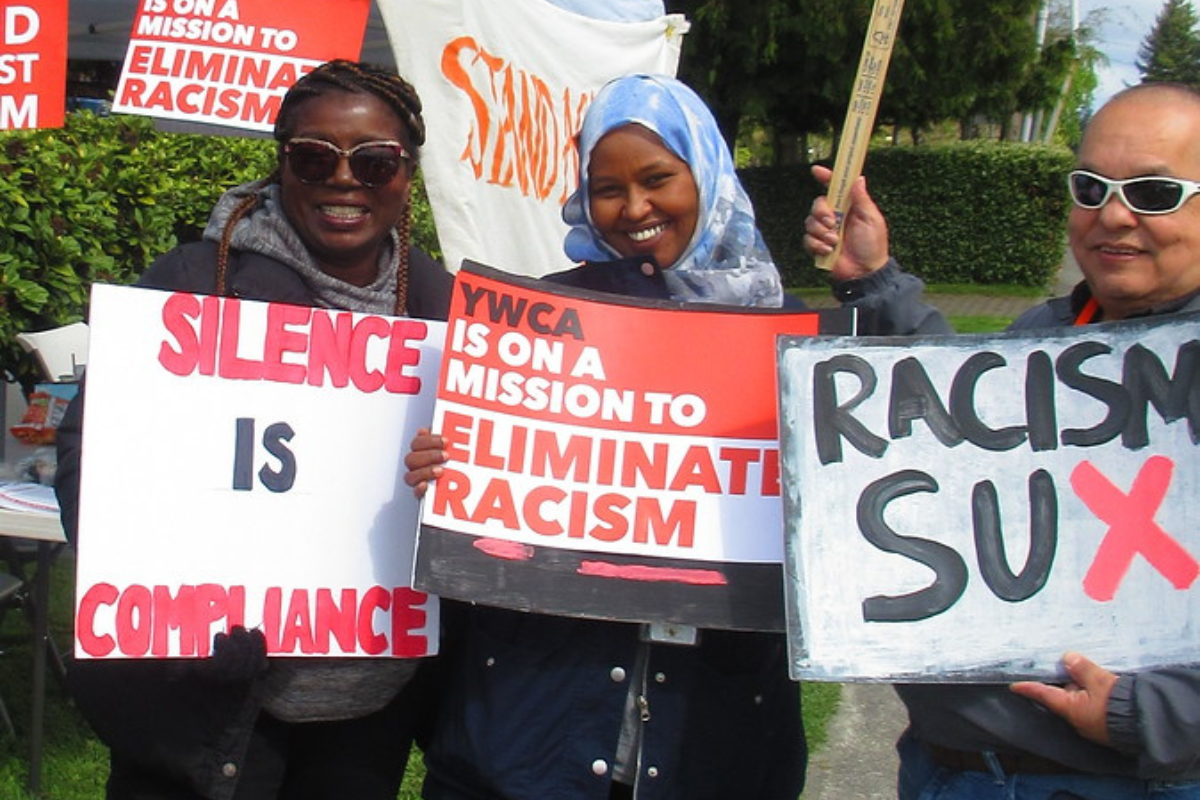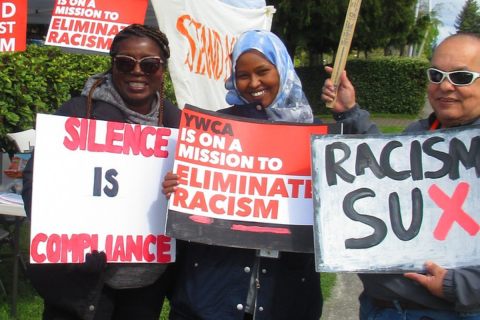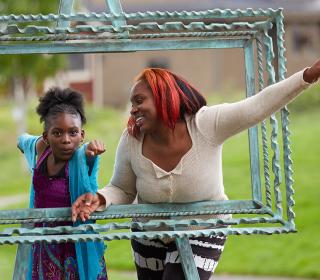Sankofa: Looking to Our Past as We Build Our Future
As part of this year’s Stand Against Racism theme, Sankofa: Looking to Our Past as We Build Our Future, we’re looking back on some of our past Stand Against Racism events and highlighting key moments and memories for people to remember or experience for the first time. The past has a lot to teach us, whether we use it as a standard to measure ourselves against or a record to see how far we’ve come.
2017
Stand Against Racism 2017 was centered around breaking down the racial barriers to housing. Along with our keynote speaker Dr. Donna Beegle, President of Communications Across Barriers, we talked about the negative effects of redlining and SOID (Source of Income Discrimination), and how structural racism presents a barrier to achieving stable shelter for those experiencing homelessness.
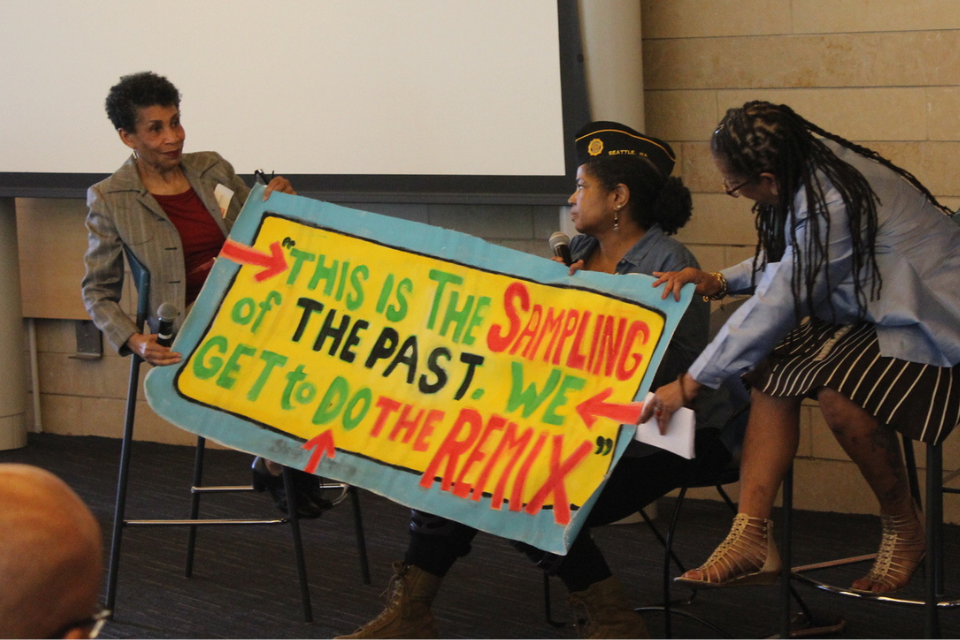
Toya Thomas, a mother from Renton who has a Section 8 voucher that she uses to help her pay rent while she cares for a child with mental illness, shared her story with us and her experience receiving an eviction notice from her apartment manager at Renton Woods Apartments, stating that she would have to leave because of her disability insurance income. Toya recounts how the news not only affected her overall mental and physical health, but also her daughter’s. “It began to affect her work, her education, everything. She'd begin to come home crying because she knew we were about to be homeless, sleeping in our cars.” Toya spoke with some of the other mothers in her building about the unfair eviction notices, and with the help of the Tenants Union and other affordable housing programs, Toya and the other women brought their concerns to City Hall in Renton. “I was afraid, I was really living in fear, I didn’t know if I was gonna get killed down on the street, raped, beaten [...] I just wanted to put the word out that we need to continue to stand up for justice and fight. Everybody deserves a place to live. I don’t care what gender you are, or what lifestyle you live, or ‘cuz you’re white or black or whatever, but lemme say this: they did put 70 Black families out of that apartment.”
Understanding how the historic racism of redlining led to inequities of wealth for Black Americans is critical to understanding how SOID discrimination today disproportionately affects Black Washingtonians.
2018
In 2018, Stand Against Racism’s 8th Annual event focused on Mental Health Through the Lens of Race and Social Justice. BIPOC people are more likely to be misdiagnosed, suffer from inadequate treatment, lack culturally competent care, and be denied access to non-emergency room mental health treatment. These disparities have led to the wrongful routing of people of color into the criminal justice system, and are often at the root of the school-to-prison pipeline.
“Race-based trauma is a consequence of emotional pain that a person feels after encountering racism," says Dr. Sharon Knight, and studies indicate that BIPOC patients do experience high rates of bias and racism in health care, as well as other areas. Compounded by the fact that people of color often lack access to accurate diagnoses and high-quality treatment, living with the daily stress of racism can negatively impact mental and physical well-being.
“If we wanna stand against racism, we first have to admit that it exists. We have to admit it's institutional,” says Mayor Jenny Durkan. “It is hard and uncomfortable to look at the past and figure out how we got here today."
2019
Building off our conversations in 2018 about mental health and racism, 2019’s Stand Against Racism was centered around the topic of “Pre-school-to-Prison-Pipeline system.” All of our different programs and housing locations participated in the discussion, including our YWCA Passage Point housing services, which offer a supportive residential community that helps parents facing homelessness after incarceration reunite with their children.
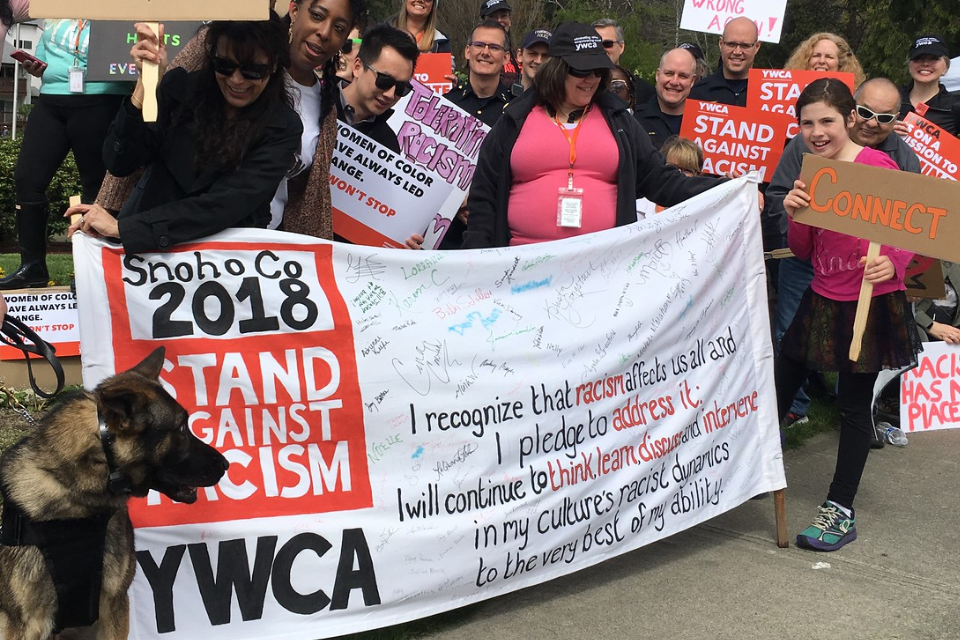
Our YWCA Greenbridge staff discussed their experience with racism and had conversations about how different races experience or are complicit in racism. YWCA Snohomish County program staff gathered in Lynnwood with community partners to advocate for standing against racism with our community, wanting to build visibility and momentum for racial equity and change. YWCA Family Village Issaquah partnered with Education Unchained, who presented the foundations of racism that largely go unaddressed.
2020
In an effort to keep our community healthy and safe, YWCA did not host an in-person Stand Against Racism this year due to the COVID-19 pandemic and lockdown.
2021
Our 10th Annual Stand Against Racism event featured our keynote speaker Ijeoma Oluo and various other supporters and partners who all spoke about finding power and using our voices to speak out against racism.
“There's an elephant in the room, and by 'room' I mean the United States of America with its citizen's discomfort about talking about race, which results in more comfort in tolerating racism. Every day it feels as though our country is imploding and there are still people who would rather tolerate racism than gather enough courage to speak out as anti-racists. It’s way past time for open honest conversations about where America has been with regards to its racist history, and where America is, and where America plans to go from here. The Stand Against Racism event is designed to be one tool for us to get there.” – Lue Rachelle Brim-Atkins, YWCA POCEC (People of Color Executive Committee) Member
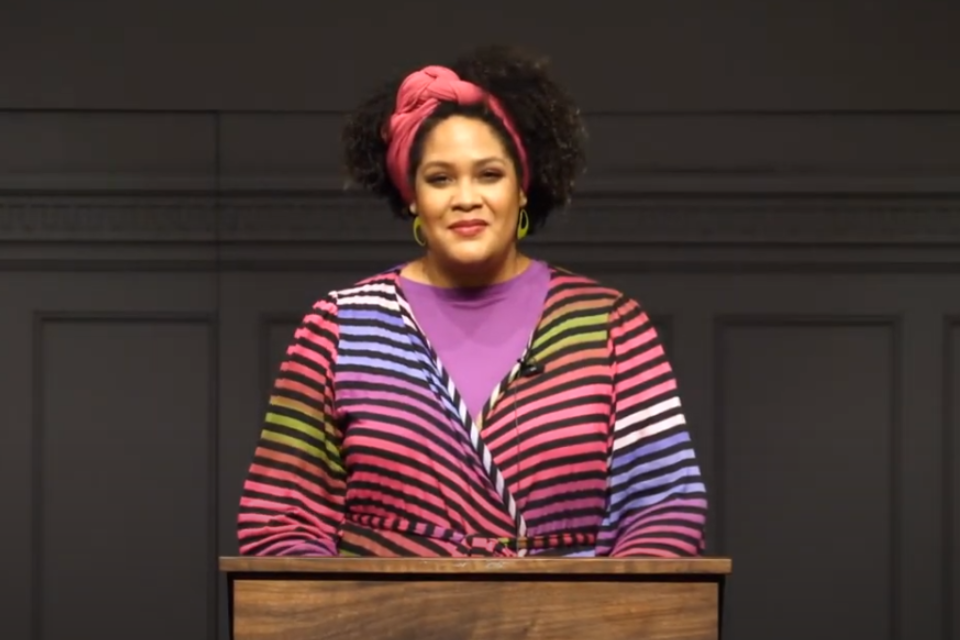
"We all have power in our systems. We do not have equal power. We do not have it all in the same places, but we have power and we must learn to engage that power now. Now, while we have the opportunity to build something new. Find your power in your school board, your PTA. Find it in your workplace, in your meetings. Find it with your vote. Find it with your church, in your community. Find it with your dollars. You find areas of action by listening." – Ijeoma Oluo.
2022
Our 11th annual Stand Against Racism, featuring our guest speakers Naomi Ishisaka, Florangela Davila, and Marcus Harrison Green, focused on the theme of media, race, and gender. Our conversations included discussions about how the media has been used to perpetuate stereotypes about and justify violence against BIPOC communities, and how it could be used in ways to disrupt racism and have a more positive effect on people’s mindsets and biases.
“We are what we continually consume in our media constantly, whether we are aware of it or not. Many people internalize these false narratives about them and treat them as true. To me, those are the things that you might say are unintended consequences or perhaps intended consequences of not presenting stories in ways that are truly accurate in terms of allowing people to be their full humanity. And I think that's when you have anti-black coverage, when you have racist coverage, that is exactly what it is. It's a denial of somebody's full humanity.” – Marcus Harrison Green.
2023
The theme for our 12th Annual Stand Against Racism event was Environmental Racism, and we discussed how racial justice is tied to climate justice, and how we can advocate for it nationally, statewide, and locally. We heard from moderator Sally Jewell (Former U.S. Secretary of the Interior) and panelists Hannah Wilson and Jamie 真理恵 Stroble, who shared their perspective on the unequal environments that exist in our society.
Structural issues in our society have created and emphasized already existing issues, and our power structures perpetuate those injustices. Redlining and land use planning determines what communities are closer to high pollution areas like airports, what neighborhoods have access to green spaces, and what areas have easy access to necessary cultural resources. The decision of who gets to live where, and a lack of representation in the decision makers who determine where cities put high pollution projects (airports, freeways, etc.) or resources (green spaces, where restoration happens, etc.) also contributes to this problem.
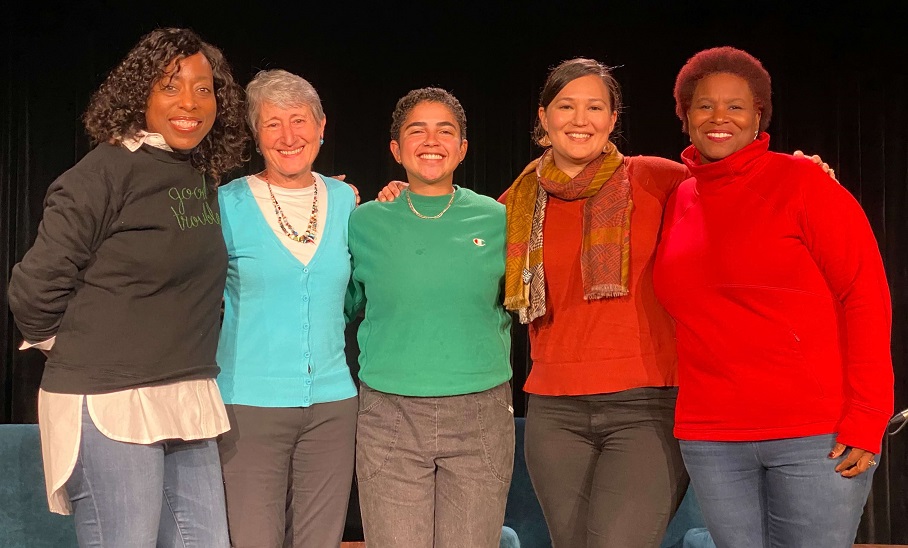
Register now to tune in virtually for our annual Stand Against Racism Town Hall on April 26, and learn more about our Until Justice Just Is campaign for more information!
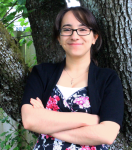
Ana Rodriguez-Knutsen is the Content Specialist for YWCA's Marketing & Editorial team. From fiction writing to advocacy work, Ana works with an intersectional mindset to uplift and amplify the voices of underrepresented communities.
We share the stories of our program participants, programs, and staff, as well as news about the agency and what’s happening in our King and Snohomish community.
